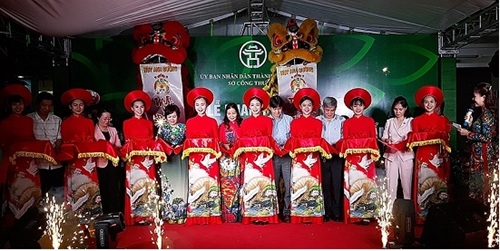According to the city’s coordinating office for the new-style countryside building program, Hanoi will boost local districts and towns’ implementation of the OCOP program and will assess and seek the municipal People’s Committee’s recognition of more than 700 OCOP products rated at least three stars by the end of this year.
    |
 |
|
At the inauguration ceremony of five new sites showcasing local goods in Hanoi. Photo: moit |
In 2019, 301 products from 18 district-level localities in Hanoi were given three stars or higher in the OCOP program. They included six given five stars and proposed to be named national OCOP products, 207 given four stars, and 88 others given three stars.
Based on this, Hanoi is looking to assess and rate about 800 - 1,000 products this year, with at least 500 to reach the municipal level (three or four stars) and 100 the national level (five stars).
The city’s Department of Industry and Trade surveyed locations for showcasing and selling local OCOP products, such as shops at train stations, Noi Bai International Airport, bus terminals, rest areas along expressways and national highways, shopping malls, supermarkets, markets, tourist attractions, restaurants, hotels, traditional craft villages, and exhibition venues.
Deputy Director of the department, Tran Thi Phuong Lan, said five sites were selected: the store of the Vun Art Cooperative and the Trieu Van Mao silk shop in Van Phuc ward, the Xuan Cuong Handicraft store at the Ngo Thi Nham auction site, the safe vegetable store at Ha Dong Market, and the OCOP showroom at the department’s industrial development centre.
She noted that goods displayed are all rated at least three stars, like silk, vegetables, and handicrafts, which are recognised as typical rural industrial products at the municipal and regional levels.
Via these sites, outstanding rural industrial products from Hanoi will have access to more consumers, providing a basis for cooperatives, businesses, producers, and farmers to continue improving goods’ quality and design to meet consumers’ increasing demand, Lan said, adding that the Department of Industry and Trade will also work with other cities and provinces nationwide to showcase their OCOP products at those showrooms.
The local coordinating office for the new-style countryside building program will provide more training to personnel in the OCOP program and upgrade the origin tracing system for OCOP products, she added.
Hanoi is expected to open 25 showrooms of OCOP products this year and raise the total to 60-70 in 2021.
The OCOP was initiated by the Ministry of Agriculture and Rural Development in 2008, based on Japan’s “One Village, One Product” and Thailand’s “One Town, One Product” programs. It is an economic development program for rural areas and focuses on increasing internal power and values, and is also to help with the national target program on new-style rural area building.
The classifications of goods and services defined in the program include food (fresh and processed farm produce); beverages (alcoholic and non-alcoholic); medicinal herbs (products made from herbal plants); fabric and textiles (products made from cotton and yarn); souvenirs, furniture, and decorations (products made from wood, fibres, rattan, metal, and ceramics); and rural tourism services and sales (services for sightseeing, tourism, study, and research).
The overall objective of the program is to develop stable and sustainable forms of production for organisations and businesses, with priority given to developing cooperatives and small- and medium-sized enterprises, towards producing traditional products and improving services with high competitiveness on the domestic and international markets, thus promoting the rural economy and national agriculture industrialisation and modernisation.
Source: VNA